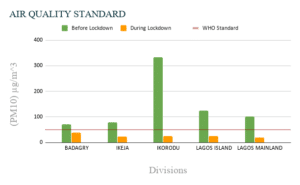An air quality index (AQI) is a measure of how polluted the air currently is or how polluted it is forecast to become. Air quality is the degree to which air is suitable or clean enough for humans, animals, or plants to remain healthy.
Air pollution is already a global public health crisis, as it kills seven million people each year, according to the World Health Organization. Among the major air pollutants of concern are carbon monoxide, carbon dioxide, oxides of nitrogen, oxides of sulfur, particulate matter, noise, and volatile organic compounds such as benzene, polycyclic hydrocarbons, and formaldehyde.
From smog hanging over cities to smoke inside the home, air pollution poses a major threat to health and climate. The combined effects of ambient (outdoor) and household air pollution cause about seven million premature deaths every year, largely as a result of increased mortality from stroke, heart disease, chronic obstructive pulmonary disease, lung cancer, and acute respiratory infections.
Major sources of air pollution in Nigeria include road transport (Heavy traffic, High fuel consumption (35% of national consumption), Old emissions technology in vehicles, Diesel and Petrol with high sulphur content (SOx, NOx), Industrial emissions (old emissions control technology) and power generation (Low electricity supply, gasoline, and diesel power generators).
Due to the COVID-19 pandemic, human activities are largely restricted in many regions in Lagos since mid-March of 2020, and it is a progressing experiment to testify the effectiveness of restricted emissions.
In this study, concentrations of criteria pollutants, PM10, PM2.5, during the lockdown was compared to business-as-usual in different regions of Lagos State and a significant difference was observed which reflected the impact of restrictions on emissions.

The changes in air pollution in this lockdown period provide an insight into the achievability of air quality improvement when there are significant restrictions in emissions from many sources and give better plans to control air pollution which is imperative for the protection of biodiversity and the ecosystem.